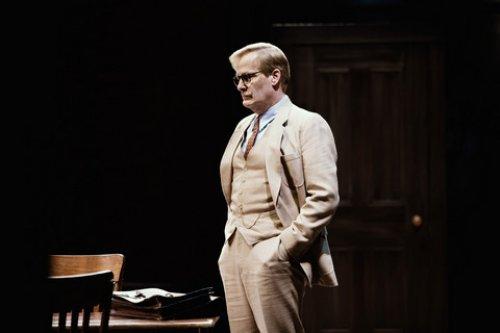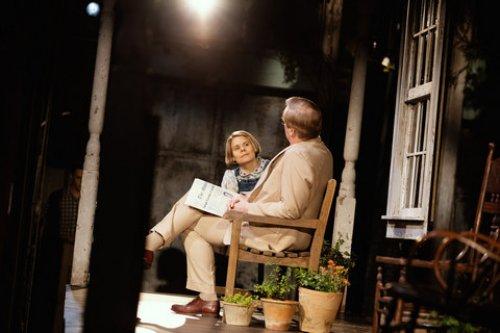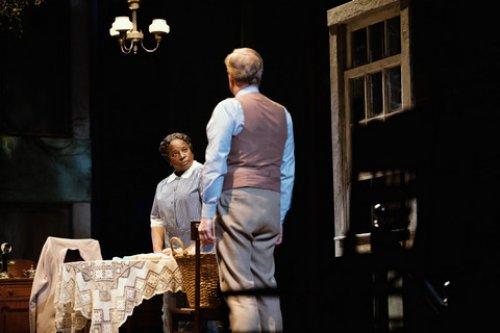To Kill a Mockingbird
Starting slowly, Aaron Sorkin’s dramatization is a magnificently moving stage version of the Harper Lee novel with Jeff Daniels as Atticus Finch giving his best stage performance yet.

Jeff Daniels in a scene from Aaron Sorkin’s adaptation of Harper Lee’s “To Kill a Mockingbird” (Photo credit: Julieta Cervantes)
[avatar user=”Victor Gluck” size=”96″ align=”left” ] Victor Gluck, Editor-in-Chief[/avatar]A novel is not the same thing as a play and a book is not the same as a movie. Award winning playwright, television and screenwriter Aaron Sorkin is clever enough to know this after having adapted the books Charlie Wilson’s War, The Social Network, Moneyball, Steve Jobs and Molly’s Game from one medium to another. His Broadway adaptation of Harper Lee’s Pulitzer Prize-winning, and now iconic 1960 novel, To Kill a Mockingbird, recounting a miscarriage of justice in 1934 Alabama, is a marvel of invention having recast the printed page into a stage worthy vehicle without having to change too much or be untrue to the novel. There are changes but the book was published 57 years ago and social expectations are different now.
In this work, he has been aided by director Bartlett Sher’s impeccable casting of each and every role. As lawyer Atticus Finch, Jeff Daniels, giving the best New York stage performance of his career, is superb as a man of integrity who has his own flaws. Early on it was decided that the children Scout, Jim and Dill would be played by adults and although it takes a little bit of getting used to before you forget that they are not children, they suitably alternate as the play’s three narrators telling the story from years later when they are grown-ups. Miriam Buether’s set design cleverly travels from the porch of the Finch house to the trial and back again, with a few digressions (the kitchen, the outside of the town’s jail, Jim’s bedroom) along the way, making it possible to tell this long and detailed story swiftly and intelligibly.

The cast of Aaron Sorkin’s adaptation of Harper Lee’s “To Kill a Mockingbird” (Photo credit: Julieta Cervantes)
While Lee had seven hours of reading time to tell her story, Sorkin has two hours and 30 minutes (including an intermission) to tell his. You can’t blame him for starting with the novel’s trial (which doesn’t begin until halfway through the novel) at the outset and then doubling back to a few incidents that happened earlier. The first act is almost as leisurely as the novel which also lacked tension, but the intensity builds up to a resounding crescendo in the second act as it reaches its moving, tragic and inevitable conclusion. Sorkin also gives the black characters a voice, one they did not have in the novel which is told by the child Scout starting when she is six and ending when she is nine. Also there are conversations implied in the novel which Scout would not have been privy to like her father’s interviews with his client or his friendly arguments with their longtime housekeeper Calpurnia which Sorkin has filled in for his audience.
To Kill a Mockingbird is famously set in the fictional town of Maycomb, Alabama, not too different from Monroeville, where Harper Lee grew up with her lawyer father, in 1934 when she would have been eight years old. Narrated by Jean Louise Fitch, nicknamed Scout, it tells of the year that she, her older brother Jem, and their summer neighbor Dill (based the young Truman Capote) learned of racial injustice in the world along with needing to see the world as others see it. Scout’s widowed father Atticus, the only lawyer in town who would take the case of a black man, is assigned to defend Tom Robinson from the charge of raping a young white woman. The case is obviously trumped up as Tom is crippled in one arm and could not have overpowered Mayella Ewell but this is the Deep South where such things used to be believed. The young people also hope to catch sight of their neighbor, the reclusive Boo Radley, who has not been seen in years and whom they fear is a bogeyman.

Celia Keenan-Bolger and Jeff Daniels in a scene from Aaron Sorkin’s adaptation of Harper Lee’s “To Kill a Mockingbird” (Photo credit: Julieta Cervantes)
As the town takes sides as to the priority of a white man defending a black man on such a charge, Scout, Jem and Dill find themselves caught up in the racially charged situation created by the trial. When Mayella’s father is disgraced by Atticus in the courtroom and shown to be a liar he vows to get his revenge.
One of the most powerful scenes in both the book and the play is when Atticus who has decided to sit up all night under Tom Robinson’s jail cell is confronted by a group of local Ku Klux Klanners. Scout who has broken her promise to her father to stay home that night recognizes one of them as the father of her classmate Walter and addresses him as in a regular social situation, causing the men to slink away. Sher stages this scene with the men in sheets coming down the aisles of the theater which makes it extremely immediate and tense as though we the viewers are in the scene. The children eventually learn that justice does not always triumph and they are personally pulled into the hatred and violence unleashed in the town. It is for them the end of innocence and the summer of coming of age.
Sher’s work with his actors is magnificent but they are so well cast it may have been an easy task directing them. Daniels began his career with a series of low-key reticent men and this is exactly how he plays his Atticus Finch: a man of few words but the ones he says count. Even when others disagree with him, he remains a man of integrity in this three dimensional portrait. Celia Keenan-Bolger who has cornered the market on ingénues in major dramatic roles is compelling as the child Scout, curious and questioning. As her teenage brother Jem, Will Pullen (Sweat) has the same kind of integrity as his father Atticus in his quiet manner, and Gideon Glick (Significant Other) as the precious Dill gives his most controlled performance yet.

Jeff Daniels and Gbenga Akinnagbe in a scene from Aaron Sorkin’s adaptation of Harper Lee’s “To Kill a Mockingbird” (Photo credit: Julieta Cervantes)
As the Finches’ housekeeper Calpurnia who is an éminence griese in the novel and doesn’t say much, LaTanya Richardson Jackson (A Raisin in the Sun) makes the most of her short scenes with Atticus in which she tells him some unpleasant truths. Frederick Weller makes the vicious redneck Bob Ewell into an even more sinister character than in the novel. As his abused, frightened daughter Mayella, Erin Wilhelmi is a pitiable figure in her court testimony giving away her ignorance and life story in her every word.
Gbenga Akinnage’s Tom Robinson is a man of quiet dignity who has learned to keep his place in a racist community. Offering comic relief, Dakin Matthews as Judge Taylor, a man of compassion and humor, is a delightful creation. As another man of integrity, Danny McCarthy as Sheriff Heck Tate makes his presence felt. In contrasting roles, Danny Wolohan plays the redneck Mr. Cunningham, as well as the reclusive Boo Radley. In cameo roles, Phyllis Somerville and Liv Rooth make a fine impression.

LaTanya Richardson Jackson and Jeff Daniels in a scene from Aaron Sorkin’s adaptation of Harper Lee’s “To Kill a Mockingbird” (Photo credit: Julieta Cervantes)
Miriam Buether’s sets are a marvel of economy putting all of the major scenes of the novel on stage with a minimum of time and difficulty. The costumes by Ann Roth are redolent of a rural community in the thirties. Jennifer Tipton’s lighting is both atmospheric and magical. The original music by Adam Guettel (The Light in the Piazza) which includes both guitar and a pump organ adds much to the ambiance of the time and place.
It has been well publicized that the Harper Lee estate filed a lawsuit in February 2018 alleging that the play deviated too much from the novel. They should not have worried. As directed by Bartlett Sher, Aaron Sorkin’s astutely scripted To Kill a Mockingbird with Jeff Daniels as Atticus Finch is a magnificent and moving theatrical experience that treats the novel with respect and dignity. The additions and changes from the novel only make the material more stage worthy and a better experience in the new medium. Harper Lee’s justly famous lines about it being a sin to kill a mockingbird and never knowing a person until you walk around in his or her skin brought an audible reaction from the audience at the performance under review, demonstrating that they were with the story all the way.
To Kill a Mockingbird (through January 16, 2022)
Sam S. Shubert Theatre, 225 W. 44th Street, in Manhattan
For tickets, call 212-239-6200 or visit http://www.tokillamockingbirdbroadway.com
Running time: two hours and 35 minutes including one intermission






Leave a comment